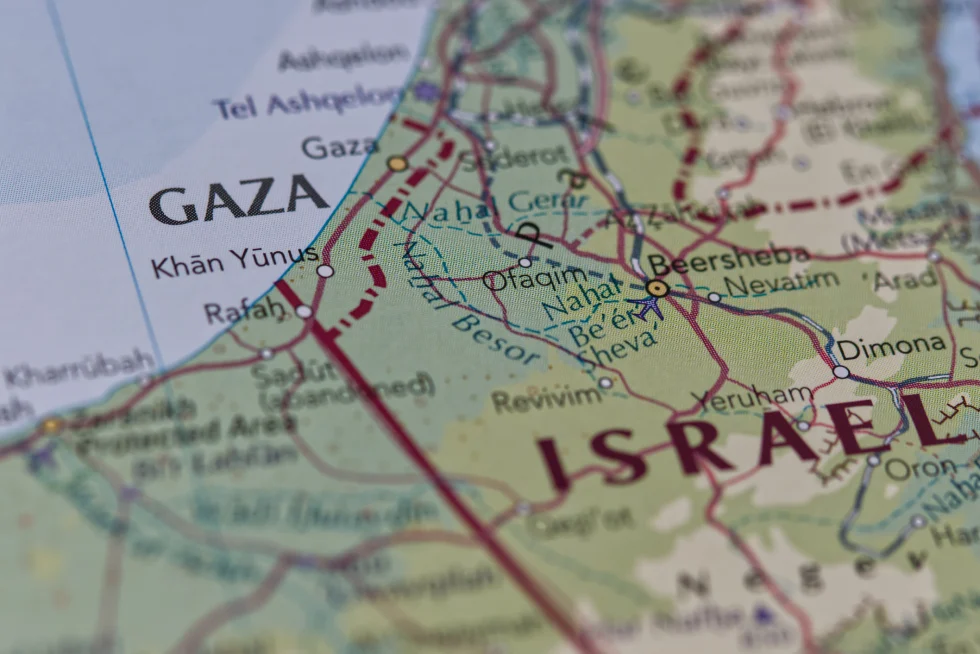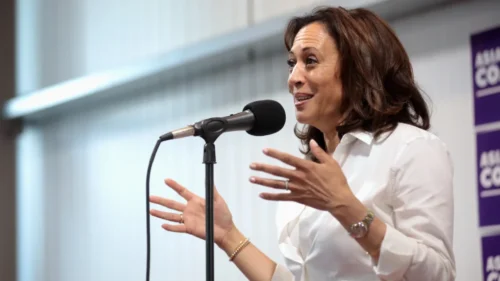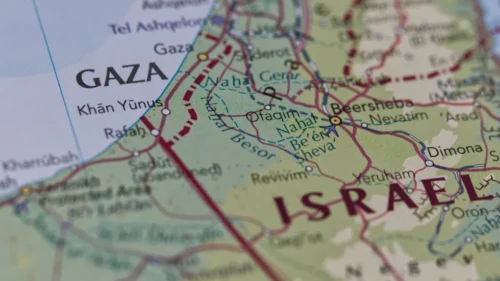The ongoing conflict between Israel and Palestine is complex and multifaceted, with historical roots dating back to the early 20th century. In 1922, Great Britain took Palestine under its administration (de facto colonized) as mandated by the League of Nations following World War I. Unlike other territories that eventually became fully independent, Palestine’s administration included the Balfour Declaration of 1917. This declaration expressed British support for “the establishment in Palestine of a national home for the Jewish people,” solidifying the Zionist goal of establishing a Jewish only state in Palestine into a reality. The 1947 UN mandate led to the creation of Israel, marking the beginning of Israeli policies characterized by settler colonialism, which have led to humanitarian crises and the displacement of millions of Palestinians.
Despite Israeli violations of international law, the United States continues to support Israel, driven by political and economic interests. Support for the Israeli occupation is considered crucial for US geopolitical strategies in the region. If Israel disappears or weakens decisively, Washington worries that BRICS countries, particularly Russia and China, may obtain control of much of the world’s oil, which would be cataclysmic for US national security. Washington’s goal is to keep the world in “balance” by keeping Eurasia divided as we shall see later.
Divisions in both Eurasia and the world are rising with the ongoing war between Israel and Hamas (as well as Palestine). The current armed conflict has created a humanitarian disaster in Gaza. As of August 15, 2024, Israeli military actions have killed over 40,000 Palestinians, including women and children, and wounded over 92,000 more. The actual deaths may be higher due to war induced underestimation. Ending this conflict requires addressing its root causes, including historic and ongoing Palestinian displacement, occupation and the reality of Zionist apartheid. Shifts in the international political economy may offer opportunities for a lasting resolution to the Israel–Palestine conflict.
History of Israeli settler colonialism
During the British Mandate from 1922 to 1947 there was large-scale Jewish immigration from Eastern Europe to historic Palestine. Jewish migration especially surged in the 1930s due to Nazi persecution. In 1947, the United Nations mandated the partition of historic Palestine into separate states for Jews and Palestinians, leading to the establishment of Israel. Since then, the Israeli state has engaged in settler colonialism.
Two parts of Israel’s settler colonialism shaped the modern conflict we see today. First is the expulsion of the indigenous Palestinian population. Following the partition, many Palestinians were expelled from the Israeli part of historic Palestine. This violated Chapter 3, Point 1 of the United Nations General Assembly Resolution 181 (II), which states:
“Palestinian citizens residing in Palestine [modern-day historic Palestine] outside the City of Jerusalem, as well as Arabs and Jews who, not holding Palestinian citizenship, reside in Palestine outside the City of Jerusalem shall, upon the recognition of independence, become citizens of the State in which they are resident and enjoy full civil and political rights.”
The second is Israel’s establishment of illegal occupations and settlements in Gaza, the West Bank and East Jerusalem, violating international law. Moreover, Israel’s occupation extends beyond Palestinian territories to regions such as the Shebaa Farms (which is part of Lebanon) and Golan Heights (which is part of Syria).
Israeli settler colonialism in Palestine, like all forms of colonial rule, is driven by political and economic motives. The primary objectives are to dominate land and resources — water, natural gas reserves and fertile soil — while systematically subjugating the Palestinian population. Additionally, settler colonialism serves to suppress socio-political conflict within Israel.
Limited access to basic necessities such as clean water, electricity and food has devastated the Palestinian people. Poverty, malnutrition and health crises are widespread. Furthermore, the systematic denial of rights to nutrition, healthcare, education, employment and freedom of movement by the Israeli occupation has caused immense suffering and deprivation. The occupation has displaced millions of Palestinians, making them refugees outside historic Palestine. Millions more face forced expulsion from their lands.
Despite these harsh measures, the US steadfastly supports Israel
Since the 1960s, the US has played a pivotal role in providing extensive material and diplomatic support to Israel, establishing it as its foremost ally in West Asia. Despite ongoing human rights abuses and international criticism, why do US policymakers, who ostensibly champion human rights, continue to support the Israeli occupation of Palestine?
One possible explanation is that US policymakers have been integrated into the Zionist project. However, this theory raises questions, as the US also supports various regimes in Eastern Europe with anti-Semitic “founding myths” and histories of complicity in the Nazi genocide — most notably in Ukraine.
Another explanation suggests that American policymakers feel a kinship with Zionism due to its roots in European colonialism against non-white peoples. However, this overlooks the history of conflicts among European and North American countries before 1945. It also ignores the ethnic diversity within Israel, where a significant fraction of Jews are not of white descent. Mizrahi Jews of Middle Eastern and North African descent are the largest Jewish ethnic group in Israel, comprising approximately 40%-45% of the country’s population.
The third, more strategic explanation posits that Washington’s support for the Israeli occupation of Palestine is crucial in maintaining a divided Eurasia as we mentioned earlier. As Hal Brands, a professor of global affairs at the Johns Hopkins School of Advanced International Studies, describes it:
“All the great conflicts of the modern era have been contests over Eurasia, where dueling coalitions have clashed for dominance of that supercontinent and its surrounding oceans. Indeed, the American Century has been the Eurasian Century: Washington’s vital task as a superpower has been keeping the world in balance by keeping Eurasia divided.”
The same view was previously articulated by Zbigniew Brzezinski, arguing that the United States’s task is to establish itself as the sole political arbiter in Eurasia and prevent the rise of any potential rival power (or alliance) that could threaten its material and diplomatic interests. Israel plays a crucial role in helping US policymakers achieve this goal. This understanding widely pervades mainstream US politics.
Therefore, considerations of the international political economy likely drive US policymakers’ support for the Israeli occupation. However, this does not negate the validity of the other two explanations.
Zionism and white racism serve as ideological tools that obscure underlying political and economic motivations. In Western Europe, legitimate rejection of the Nazi genocide legacy is often invoked to make it politically unviable to criticize US support for Israeli occupation. This effort aims to maintain European countries’ limited strategic autonomy vis-à-vis the US. In the Global South, support for Palestinian freedom has varied with the consolidation of the neoliberal project, but remains present. Today, many Global South countries commonly condemn Israeli violations of international law.
Washington continues to support Israel even as the Israel–Hamas war persists, with Israel being accused of war crimes and causing a humanitarian crisis in Gaza.
The state of the Israel–Palestine conflict today
For years, Gaza’s two million residents have endured Israeli-imposed blockades marked by violence, severely restricting travel, trade and daily life. Under these conditions, Palestinian resistance to Israeli occupation has evolved and intensified.
Tensions between Israel and Palestine have often run high, but the events of October 7, 2023 marked a new level of horror. The current round of armed conflict began when Hamas launched attacks against Israel. The subsequent Israeli armed response, primarily targeting Gaza (but also on the West Bank), demonstrates a now genocidal colonial policy.
Israel has launched indiscriminate airstrikes and heavy artillery attacks on civilian-occupied areas of Gaza. The Israeli Defense Force (IDF) has destroyed most buildings there, including hospitals, schools and residential structures. Particularly egregious is the use of artificial intelligence to target buildings without human corroboration of the generated kill lists, resulting in mass civilian deaths among Palestinians.
Besides attacking cities where Palestinians seek refuge, Israelis have seized control of the crossing into Rafah on the Egyptian border in violation of the Camp David Accords. This control allows Israel to use the blockade as a tool of war, causing mass starvation by preventing food, medical supplies and essential aid from entering Gaza. The insufficient aid that makes it through fails to meet escalating needs, leading to starvation and disease. This exacerbates an unprecedented humanitarian crisis and violates international law.
Despite the IDF’s assaults, Hamas resistance fighters persist in operating through extensive tunnel networks, complicating Israeli efforts to neutralize them.
In addition to these ongoing attacks on Gaza and the West Bank, Israel has also engaged in military conflicts with Hezbollah in Lebanon. The border between the two countries has witnessed daily exchanges of fire since the current conflict broke out. The fight with Hezbollah has not yet escalated into a full-fledged war, but fears are growing as both sides continue to carry out strikes. It remains to be seen whether the most recent Israeli attacks on Hezbollah using exploding pagers and walkie-talkies will ignite the situation further.
Iran’s mission to the UN has warned that any “full-scale military aggression” by Israel in Lebanon could trigger “an obliterating war.” Tensions have run high between Tehran and Jerusalem following Israel’s attack on the Iranian embassy in Syria and the assassination of Ismail Haniyeh, the political leader of Hamas in Teheran. However, repeated rounds of mediation seems to have defused the situation for now.
The Ansarallah (Houthi) forces in Yemen have imposed a naval blockade on ships passing through the Red Sea to and from Israel, excluding those of Israel’s supporters. Reportedly, their goal is to pressure for a resolution to the conflict stemming from Israeli attacks on Palestine. Despite military operations on Yemen led by the US and its “allies,” these ineffective efforts have not ended the naval blockade.
The scale and intensity of Palestinian killings by the Israeli armed forces have sparked unprecedented political reactions in the US, particularly outside the mainstream. Students and educators across many universities are protesting en masse, urging their institutions to sever financial ties with Israel and calling for a shift in US foreign policy toward Israel. These protests are concerning for the Biden administration, as they resonate strongly with the progressive wing of the Democratic Party. If the administration continues its unwavering support for the Israeli government, it may adversely affect Democratic Vice President Kamala Harris’s prospects in the 2024 presidential election.
Consequently, the current administration is attempting a balancing act. It publicly critiques some Israeli policies, such as calling for the replacement of Israeli Prime Minister Benjamin Netanyahu and imposing sanctions on certain Israeli settler groups in the West Bank. It has also publicly stated that weapons will not be supplied to the Israeli armed forces for attacks on Gaza. However, in practice, the administration continues to support Israel through military aid, even during attacks, and provides diplomatic cover. This was evident when the administration vetoed a UN Security Council resolution advocating full membership status for Palestine.
The nuanced public posture of Washington regarding its verbal policies is also influenced by another factor. With the end of the unipolar moment, marked by increasing strategic alignment between China and Russia, many countries in the Global South are asserting greater strategic autonomy. This was evident in the overwhelming United Nations General Assembly vote in favor of full membership for Palestine.
Given that US support for Israel’s policies is driven by its aim to maintain division in Eurasia, excessive support in a multipolar world may counteract this objective.
Two examples illustrate this point clearly. First, Saudi Arabia, now aligned with the BRICS nations, has insisted that any strategic engagement with the US must exclude Saudi recognition of Israel. This stance appears not to have been opposed by the US government, despite directly contradicting the intentions of the Abraham Accords.
Second, many countries in the Global South, historically aligned with the US such as Egypt — also a BRICS member — are actively pursuing a genocide case against Israel at the International Court of Justice (ICC). This legal action was initiated by South Africa and highlights shifting alliances and strategic autonomy among these nations.
Within Israel, Netanyahu is concerned that ending the military offensive without achieving a clear “victory” could not only end his political career but also result in his conviction on corruption charges. This partly explains his repeated escalatory interventions. Meanwhile, family members of Israelis held by Hamas are advocating for negotiations between Hamas and the Israeli government to defuse the situation. Israel’s increasing international isolation, coupled with military setbacks and economic challenges, is prompting calls for a change of course from some quarters within the country.
How do we achieve lasting peace in the region?
To bring an end to the war, addressing the roots of the conflict is essential, including historic and ongoing Palestinian displacement, occupation and the reality of apartheid. Against this backdrop, any lasting resolution to the Israel–Palestine conflict must include the following elements:
First, the ongoing genocidal attacks on innocent Palestinians by the IDF must be universally condemned. Those responsible for Israeli crimes against international law must be held legally accountable. Second, there must be an immediate ceasefire. Proposals are currently being discussed. Hamas has announced that it is willing to accept the proposal of the US President Biden that was put forward in May 2024 but Israel remains recalcitrant. Third, immediate humanitarian assistance and relief measures, including infrastructure rebuilding, must be provided to Gaza, the West Bank and East Jerusalem.
These are initial steps, but addressing the root cause of the conflict — the Israeli occupation of Palestine — is essential for achieving a lasting resolution. Several steps are required to make this happen:
One, Israeli occupation of all Palestinian territories must end unconditionally.
Two, all Palestinians displaced from historic Palestine must be accorded the right to return and live with full human rights. If Israel cannot agree to this, it should make mutually acceptable territorial concessions from its share of historic Palestine to rehabilitate displaced Palestinians. These lands should be fully integrated with Palestine.
Three, both Israel and Palestine must recognize each other’s right to exist as an independent country, with Palestine having membership in the UN to match Israel’s.
As discussed earlier, fundamental shifts in the international political economy have made a lasting resolution more achievable. Countries in the Global South and like-minded nations are increasingly vocal in their opposition to Israeli occupation. The international community urgently needs to increase its measures to pressure Israel and its external supporters into agreeing to a sustainable solution to the Israel–Palestine conflict.
[Ting Cui and Lee Thompson-Kolar edited this piece.]
The views expressed in this article are the author’s own and do not necessarily reflect Fair Observer’s editorial policy.
Support Fair Observer
We rely on your support for our independence, diversity and quality.
For more than 10 years, Fair Observer has been free, fair and independent. No billionaire owns us, no advertisers control us. We are a reader-supported nonprofit. Unlike many other publications, we keep our content free for readers regardless of where they live or whether they can afford to pay. We have no paywalls and no ads.
In the post-truth era of fake news, echo chambers and filter bubbles, we publish a plurality of perspectives from around the world. Anyone can publish with us, but everyone goes through a rigorous editorial process. So, you get fact-checked, well-reasoned content instead of noise.
We publish 3,000+ voices from 90+ countries. We also conduct education and training programs
on subjects ranging from digital media and journalism to writing and critical thinking. This
doesn’t come cheap. Servers, editors, trainers and web developers cost
money.
Please consider supporting us on a regular basis as a recurring donor or a
sustaining member.
Will you support FO’s journalism?
We rely on your support for our independence, diversity and quality.











Comment